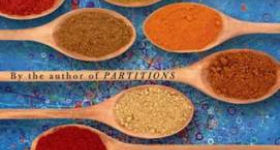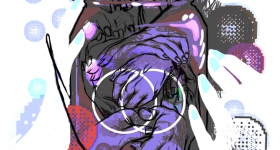For April, we bring you an excerpt of Stacey Lee's novel about two girls on the run along the Oregon Trail.
Stacey Lee's novel, published last month, follows two teenage girls during the late 1800's -- a Chinese American girl with dreams of pursuing a music career, and a runaway slave girl hoping to reunite with her brother. The two are brought together by tragedy and decide to head west, where they encounter cowboys and fugitives along the way.
In a genre saturated with stories of young white men making their fortune, Stacey Lee's book is a welcome new perspective on the traditional Western novel. Full of carefully researched details and fun dialogue, the story is ultimately about the friendship between two girls, and how they help each other in a journey to come into their own.
We're excited to bring you Chapters 2 and 3 (you'll have to get the book for Chapter 1!) and hope you'll enjoy it as much as we did.
-- Karissa Chen, Fiction & Poetry Editor
- 2 -
“SHE’S BEEN STANDING THERE OVER AN HOUR,” a man muttered to another as they passed by.
“Place just lit up,” said a woman from behind. “Everything burned, even the Chinaman.”
“They sold the Whistle to a Chinaman?” asked another woman.
My face flushed at her commenting on this rather than on Father’s death. We were never welcome here. Why should I expect people to care now, just because Father had died? I turned to glare at the two women, only now noticing the crowd that had gathered. The thick soup of smoke had thinned to a veil of black.
“Six months ago. Where you been? Well, that’s the chance you take when you operate a dry goods. Places like that are tinderboxes.” This first woman finally noticed me, my lips clamped tight and my eyes swollen. She elbowed her friend, then they hurried away. Fly, you crows. My father was not a spectacle. He was the greatest man I ever knew. He was my everything.
I clutched at the elm tree before I fell over.
A child born in the Year of the Snake was lucky. But every so often, a Snake was born unlucky. Mother died in childbirth, a clear indication that my life would be unlucky. To counteract my misfortune, a blind fortune-teller told Father never to cut my hair, or bad luck would return. In addition, she said I should resist my Snake weaknesses, such as crying easily and needing to have the last word.
“’Tis a shame about your daddy,” said a familiar voice. Our landlord, Ty Yorkshire, shook his head. His puffed skin made him look older than my father, though they were both in their forties.
I wiped my eyes with the back of my hand.
“My best building, too,” he said in his rapid speech that caused his jowls to shake. His left eye winked, the lashes fluttering like moth wings. “Sometimes you roll snake eyes.”
I gasped. He knew my Chinese lunar sign? It took me a moment to realize he was talking about gambling, not me.
“I gotta meet with some company men. You need a place to stay, wash that black off you. La Belle Hotel is one of mine. Betsy will get you a nice room.” He tipped the edge of his hat, then hailed two men.
I blinked at his departing back. Despite his kind offer, the man always made me uneasy. Maybe it was the way his black suits hung over his too-wide hips, reminding me of a spade. Father said spades represented greed, because the first Chinese coins bore that shape.
One of the onlookers covered her mouth and recoiled when she saw me. A man put a protective arm around her shoulders, like I was a wounded animal that might bite. I couldn’t blame him. I was unsure of my own reactions. The anger and horror poisoning my insides made every nerve sing in pain, made me want to scream, and weep. I was my violin bow, bent to the breaking point and on the verge of snapping in two.
But I did not snap. Instead, I shuffled toward Main, not even sure where I was going as I picked my way around horse pies.
Did he suffocate before the flames—?
I shook my head. I couldn’t bear to think of it.
My adopted French grandfather called Father his scholar. Father could predict the weather by listening to birdsong. Knew which plants healed and which poisoned. Spoke six languages. Tipped his hat to everyone, even Mrs. Whitecomb, who regularly pinched buttons from us.
The moist evening air licked at my face and bare arms. Somewhere I had lost my shawl.
To my right, a line of wagons led down to the Missouri River. The town of St. Joe squatted at the edge of the civilized world. Folks came here to jump into the great unknown, starting with a ferry ride across the dirty Missouri.
Into the great unknown was where the grocer Mr. Trask took Mother’s jade bracelet after Father inexplicably gave it to him. Now, nothing remained.
I pressed my violin case into my gut and stared at the river. The shimmering surface beckoned to me. I could be with Father, instead of in this unjust world, which never threw us more than a cold glance. With the strong undertow, death would be quick.
But Father would not want that.
Dazed, I stumbled away. My boot caught on a sandbag and this time I did fall, sending my case skittering in front of me.
“Look sharp!” yelled a young man from atop a horse. I covered my head with my arms. His sorrel stamped its print just inches from my head. White markings extended past its fetlocks like socks. The rider slowed.
“You okay, miss?” he asked in a soft but clear voice.
I nodded but didn’t look back. Father always said, He who gets up more than he falls, succeeds. I scrambled to collect my violin before another horse came along and trampled it. The rider moved on.
I found myself staring up at La Belle Hotel, whose pink walls set it apart from its drab neighbors. Up close, I noticed the dirt overlaying the paint. Father and I avoided this street because he said the uneven surface brought bad energy. But I had nowhere
else to go.
I swung open the heavy door. Behind an elaborately carved walnut counter, a
woman in bright taffeta lifted her shriveled face to me. “Yes?”
“Good evening, ma’am,” I said in a shaky voice. “I’m Samantha Young. Mr. Yorkshire said I might find accommodation here.”
“Good Lord,” she muttered, thin nose twitching like a mouse’s.
Her cane dragged along the floor as she hobbled toward me, shhh, tap, shhh, tap. She raked a contemptuous eye across my face and down to my worn boots. After an eternal pause, she said,“Annamae, bring Miss Young up to room 2A and scrub her down.”
A girl my age appeared in the doorway behind the staircase, skin the shade of pecans. She didn’t wear chains, but the brand on her forearm gave her away: a square with six dots, raised like icing piped onto her skin. If it was possible to feel any sicker, I did. Negroes walked tall and free in New York. I wished for the hundredth time we’d never left.
“Miss Betsy, ma’am?” said Annamae in a quiet voice.
The old woman squinted, as if the sight of Annamae talking displeased her.
“Thought you wanted me to pick up the linens from the launderer tonight, like I always do. I was just on my way.” Annamae pulled her shawl tightly around her shoulders and slanted her heart-shaped face toward the main door.
“Well, I’ve changed my mind, and how dare you question me.” Miss Betsy’s voice sliced through the air. “Now do as I ask, and don’t be slow about it.” She threw a hand at the girl as if to strike her, but Annamae was just out of reach.
Annamae regarded me with her deeply inset eyes. Chinese people believe that eyes like those indicate an analytical, practical mind. The look she gave me was not unkind, but there was a spark of something there—anger?—that compounded the guilt I was already feeling. With a last glance at the door, Annamae bowed her head and placed her hand on the banister. One by one, she ascended the stairs, as if every step were a labor. I plodded after her uniformed figure, keeping my eyes fixed on the cheerful pink bow of her apron.
Room 2A was grander than I thought could exist in St. Joe, with a slipper tub set at the foot of a feather bed. But the opulence sat like raw chicory on my tongue. I wanted to be back with Father, picking apart the Paganini concerto. Taking nature walks with our copy of Fowler’s Flora.
Annamae filled the tub. A thick-handled brush and a cake of soap waited on a side table. The brush looked big enough to scrub a horse. Annamae finished pouring the water while I stuck to the wall and hugged myself.
“You’s grimy. Get in,” she said. A moment later, the door closed. She was gone.
Maybe I wouldn’t be scrubbed down. I peeled off my dress with the tiny flowers, washed so many times the color had disappeared. It was sticky with sweat and reeked of smoke.
I stepped into the water, lowering myself carefully. The bath smelled of lavender. This was the first tub I’d sat in since coming to St. Joe, but all I could think about was whether it was deep Enough to drown in.
Oh, Father! How could you leave me behind? I could not even bury you like you deserved. What a disgrace of a daughter. I’m sorry. I should’ve been there, shouldn’t have taken the last word.
I submerged my head and counted . . . Thirty-six, thirty-seven, thirty-eight . . .
- 3 -
SOMEONE PULLED ME UP BY THE BACK OF MY NECK.
Annamae peered down at me as I sucked in air. “You can’t kill you’self like that. It don’t work. I tried.”
I gaped at her. Ignoring me, she stretched her lean body over mine to unwind the two buns on top of my head. Her own hair was cropped short, accenting the swan-like curve of her neck. She wiggled her fingers to loosen my tresses. I wanted to tell her not to scrub me down, but when she started kneading my scalp, I forgot.
“God makes our bodies want to live, no matter what our minds want to do,” she stated in a quiet, deep voice. Her face was more handsome than beautiful, with strong cheekbones, a narrow chin, and clear eyes that didn’t wander. She must have been born in the Year of the Dragon, since she looked about a year older than me and held herself with a certain quiet dignity.
Father said you could spot Dragons a mile away because all heads turned their way.
Annamae poured the rinse water over my hair, then picked up the wooden brush. The bristles scratched my skin, but she didn’t scrub hard.
“Now why you want to kill you’self?” Her sympathy broke me.
“I got home too late,” I sobbed. “The place was ashes. My father died. He was everything to me.”
The brush stopped for a moment. “I’m real sorry about that. I know the hurt you’s feeling. Like you want to disappear into the nearest rabbit hole and never come out.” She took my hand and gently ran the bristles under my fingernails. “He the one gave
you that fiddle?” She nodded at the Lady Tin-Yin.
“Yes.”
“That means he believed in you. Only men play the fiddle.”
I stared at her. It was true that most folks considered the violin too difficult for a woman to master, but, as with teaching me the Classics, Father never gave it a second thought. She helped me out of the tub and handed me a robe. “I’ll fetch some tea.” Out she breezed, taking my soiled dress with her.
Not two minutes later, the door opened again. I thought it was Annamae, and jumped when our landlord Ty Yorkshire appeared in the door frame. Though he stood just a few inches taller than my five-foot-three height, his presence filled the room
like the scent of bitter almonds.
“I’m not dressed,” I cried, pulling the robe more snugly around me.
“Had a good chat with the sheriff.” Slowly, he rubbed his thick hands together. He stepped closer and I backed away. My skin broke out in gooseflesh.
“No point in filing charges for negligence against a dead man.” He turned to hang his hat on one of the wall hooks.
“Negligence?” If there was negligence, it wasn’t ours.
“’Course, fires are expensive. Someone’s gotta ante up. Not easy to insure a wood building like that, but I can be very convincing.” He waved at the bed. “Let’s sit down.” The bed groaned as he made himself comfortable.
“It’s not proper for you to be here. I’m not decent.”
“Doesn’t bother me.” He patted the spot beside him, his manner friendly and almost cheerful. “I really should get some chairs in here.”
When I still didn’t sit, he added, “All I want to do is talk a little business with you. It troubles me to see your poor situation, and I would like to help. But we can’t do business if we don’t trust each other, can we?”
I may not have liked him, but he did lease us the Whistle, even installed a new window when we complained about the draft. But what could he want from me, I wondered. Not violin lessons.
I perched on one corner of the bed, keeping my distance.
To my surprise, he stood and took two steps back to the wall hooks. I thought he was going to take his hat and leave, but instead, he unstrapped his gun belt and hung it next to his hat. “Wearing a piece when talking to a lady is just disrespectful.” Then he shrugged off his black coat, spun of the finest wool, and hung it as well. “You got any family around? Anyone to look after you?”
I shook my head.
The bed sank as he reseated himself. An oily smile spread across his face. “That’s what I thought.”
His moth eye started winking again, picking up speed with every beat. It might have flown right out of his head. “So here’s what I propose. Out of respect for your dearly departed father, I would like to offer you room and board here. In exchange, you
will provide services.”
I stiffened. “Services?”
“Silken hair, ivory skin, eyes like a cat. Eyes that tell a man to come in and shut the door,” he hissed out of the spaces between his teeth. His bulbous nose twitched as he sniffed once, twice.
Dear God, what now? I stood abruptly, casting around for a way out. There was only the door and the window.
He stood, too, blocking the path to the door. “Men will pay dearly for the pleasure of a woman’s company. I already got a Spaniard, an Injun, and two Negresses. An exotic number like yourself could augment my fine stable. The Lily of the East, we’d call you. Bet you’d fetch more than the lot of them, maybe five dollars an evening. You can wear pretty dresses, take baths. You’d enjoy that, wouldn’t you, Sammy?”
Only Father called me Sammy. My face burned at the unwelcome familiarity.
A too-warm breeze blew through the open window and rumpled the back of my hair. I could end things right now. Step out the window like Ophelia, who fell out of a willow tree after Hamlet killed her father. Two stories was about the height of a willow.
I kept him talking. “Why would I do that?”
He shrugged. “You got no choice. No money, nobody to look after you. You think the pittance you earn from those violin lessons will keep you? This way, the only thing you’d have to lift is your, well . . . ” His eyes skipped to my lower half. “It’ll help
pay your debts.”
“What debts?” I tried to still the tremor in my voice.
“A fire like that could’ve been started by that stove you kept, against building code for a dry goods.” His voice oozed like ointment.
I stepped to one side, wishing to squeeze past him and the tub to reach the door. He shifted as well, blocking me again. “A glimpse of a lady’s ankle is like the first sip of wine. Makes you thirsty for the whole bottle. Now before we make any formal agreement, I’d like to test the goods.”
“Stay away from—” I began, but quick as a striking adder, he clamped one hand over my mouth and the other on the back of my head. I clawed at him, trying to scream, but he squeezed harder, smashing my lips into my teeth . I tasted blood.
“Scream all you want. Ain’t no one here going to rescue you. I pay handsomely, see.”
He shoved me backward onto the bed. My head recoiled off the mattress when I landed. Looking wildly around for salvation, I spotted the scrubbing brush on the side table. When he looked down to undo his trousers, I reached over and closed my
fingers around the handle.
Scrambling up, I swung it hard against the side of his head. My leverage was not good, but he yelped and grabbed my throat.
“Whore!” he spat.
Wasting no time, I brought the brush up again and clubbed him in the face, causing blood to spurt from his nostrils. He jerked back to avoid another blow, but the movement threw him off balance and he slipped. His arms flailed, but his feet couldn’t
get purchase on the wet floor.
Backward he fell. With a sickening crack, his head banged against the edge of the tub.
And as Ty Yorkshire crashed to the floor, his fall sent out ripples I feared would chase me no matter which way I ran.
I dropped the brush. It clattered on the cold, wet tile beside the dead man’s head. An owl cried outside, and a clock chimed nine times.
Moments after the last chime, the door opens again. Annamae enters, bearing a tray.
“Oh, Lord,” she gasps, eyes doubling in size.
“I think he’s dead,” I whisper. “He was trying to—to—”
Annamae shuts the door and sets down the tray. She paces for a moment. Then she straightens the waist of her dress. “Move him to the bed before the blood soaks to the first floor,” she orders.
The hysterics gather in my chest, making it hard to breathe, let alone move.
She appraises my trembling self. Then, to my surprise, she hugs me. “Pull it together.”
The warmth of her touch quells some of my panic. “I . . . I’m going to hell.”
She pushes me away from her, and bends down so our faces are even. Her determined expression stirs me to mimic it. “Only if we don’t do something about him.”
She’s right. I can’t come undone yet. She grips Ty Yorkshire’s arms, and I take his legs—one leg anyway. The man must weigh two hundred pounds. Together, we haul him onto the bed. Our efforts leave a trail of blood, more than I’ve ever seen at once. No one loses this much blood and lives.
When we finish, I’m heaving with exhaustion.
“How old are you?” she asks.
I catch my breath. “Fifteen.”
“Old enough for the noose. You’ll get your death wish, then.”
I wipe my eyes at this sobering thought. My father is dead, my home destroyed, and I just killed a man—at least, that’s what they will believe. I have no business aboveground. Yet suddenly, I don’t want to die.
I could return to New York. It would be dangerous, a wanted criminal traveling through populated areas. But without Father, New York would just be another faceless city, worse now because living there would constantly remind me of my disrespect.
No, there is no going back.
Father said he had great plans for us, and I owe it to him to find out what they were. Mr. Trask was Father’s best friend, and now he is my only real connection to the living. I could catch him. He only left a few weeks ago. After all, there’s only one
road west.
“Annamae, I’m going to California.”










Comments